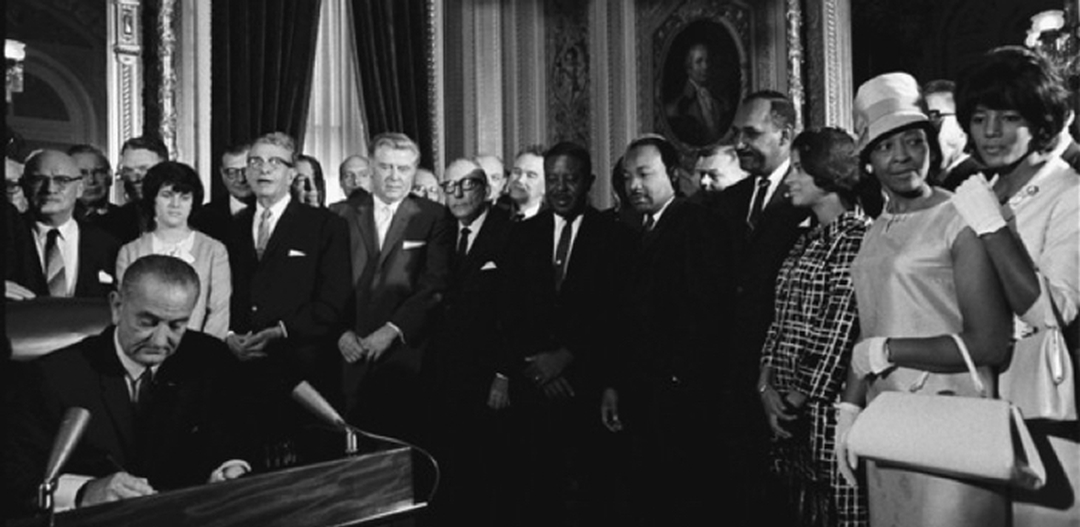Law Center News
Chancellor Pierre and Adj. Prof. Augustine publish law review article on the Voting Rights Act

Chancellor John Pierre and the Rev. Jonathan C. “Jay” Augustine, an adjunct professor at the Southern University Law Center, recently published an article titled “The Substance of Things Hoped For: Faith, Social Action and Passage of the Voting Rights Act of 1965” in the Cumberland Law Review.
The article explores how faith and faith-based leaders worked through life-threatening and often life-ending struggles to ensure the Fifteenth Amendment guarantee would no longer be usurped by the institution of racism, and that Blacks would have the ability to elect candidates of their own choosing. The abstract to the article provides:
In the spring of 2015, Paramount Motion Pictures released Selma, a movie based on the historical occurrences that led to the infamous day in American history known as “Bloody Sunday,” and President Lyndon Johnson’s signing of the subsequently passed Voting Rights Act of 1965 (“the Act”). Selma popularized for a new generation the clergy-led struggle for an egalitarian society, especially in the Jim Crow Deep South, where legislation was needed to ensure well-documented patterns of invidious discrimination in the polling place would end. This article, written in the same vein as Selma, shows how faith and faith-based leaders worked through life-threatening and often life-ending struggles to ensure the Fifteenth Amendment guarantee would no longer be usurped by the institution of racism, and Blacks would have the ability to elect candidates of their own choosing.
With the biblically based “suffering servant” theology detailed by the messianic writers in Isaiah 53 as an undergirding theme, this interdisciplinary article brings together law, history, and theology to explore the Judeo-Christian concept of suffering being redemptive. Dr. Martin Luther King Jr. made this concept extremely popular during the Civil Rights Movement. Further, as its central thesis, this article argues, in paraphrasing the writer of Hebrews, that faith brings to fruition things that might otherwise seem impossible, when faith is the precedent to social action. Indeed, just as prior to the faith-motivated and dissident demonstrations that resulted in Bloody Sunday, the Act seemed like an impossibility. When faith leads to social action, however, otherwise impossible results can include the election of Blacks to local, state, and federal office, with the most significant being the election and re-election of Barack Obama, the first Black president of the United States of America.
The article is divided into five parts, supporting the central thesis that faith-based actions lead to passage of the Act. Part I serves as an introduction, providing an overview of sociopolitical conditions that necessitated the Act’s enactment. Part II builds upon Part I by describing the evolution of Sections 2 and 5 of the Act. The authors detail why the two sections, arguably the Act’s most important parts, remain very important. Part III explores how a theology of civil disobedience, motivated by faith and the Judeo-Christian concept of suffering being redemptive, shaped a climate for the freedom rides and lunch counter sit-ins of 1961. These events served as a natural preference to Bloody Sunday in 1965, a watershed sociopolitical occurrence that forced President Johnson’s Great Society Initiative to include voting rights, along with education reform and poverty eradication. By setting a theological foundation of where faith and social action meet, Part III details some of the chronological events that led to the Act becoming law.
The article’s Part IV looks at the political reality of how the Supreme Court’s 2013 decision in Shelby County v. Holder undermines and essentially guts the Act’s practical reach, while somehow leaving it constitutionality intact. In conclusion, Part V looks at the Act’s future and limited practical application. Unless those in the post-modern era replicate the actions of the Movement’s faith leaders and demand that the Republican-controlled Congress act in response to the Court’s decision in Shelby County and enact a new and improved Act, its future is arguably very bleak.
Chancellor Pierre is the Vanue B. Lacour Endowed Professor of Law at SULC. He joined the SULC faculty in 1990, and he teaches courses and writes in tax law, sales and contracts, real estate and commercial law. Pierre has previously taught at California State University, the Southern Methodist University School of Law, the Loyola University Law School, the Southern University College of Business, Saint Leo’s College, Webster University, Louisiana State University, and Baton Rouge Community College. View his scholarship by clicking here.
Rev. Jay Augustine is the senior pastor of the Historic St. James African Methodist Episcopal Church (AMEC). He is also an author and a nationally recognized social justice advocate. His book, “The Keys Are Being Passed: Race, Law, Religion & the Legacy of the Civil Rights Movement” was published in 2014 by ROM Publishing. Augustine previously served as executive counsel and director of legislative affairs for the Louisiana Workforce Commission, and as vice president of the East Baton Rouge Parish School Board. Additional information on Rev. Augustine can be found here.
RSS News Feed